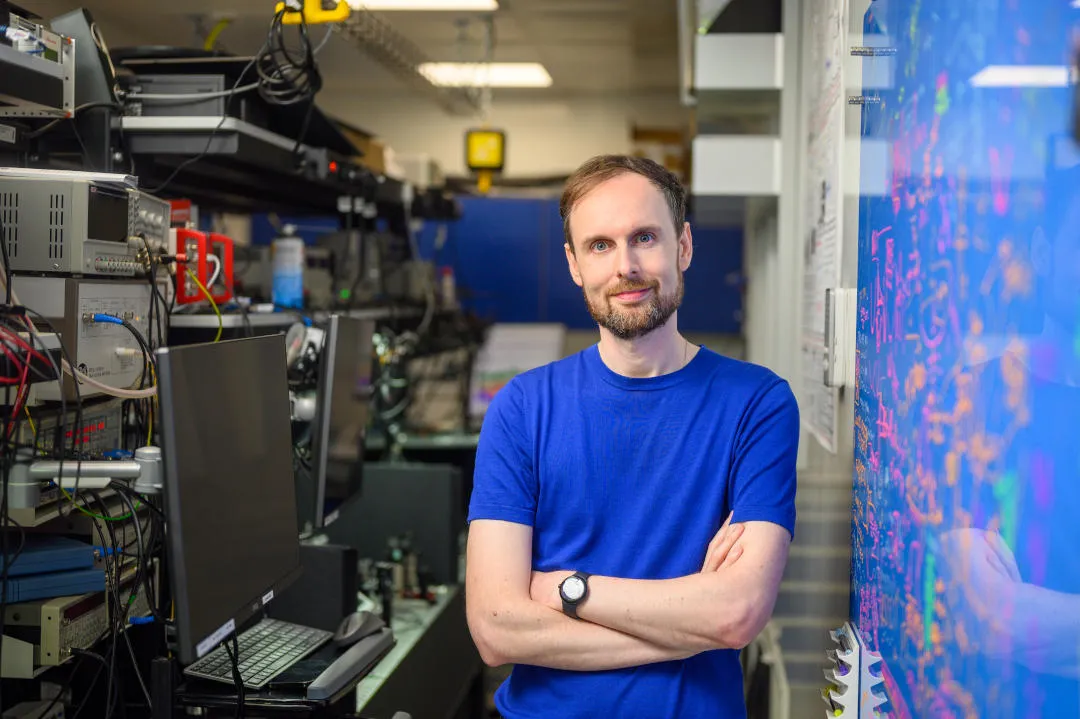Please note: this event has passed
Calling all STEM students from GCSE to A Level to university! Welcome to the first of our new series of Annual Physics Schools Lectures. Join us here at King's to explore the ever unfolding world of quantum science, and the amazing discoveries which will reshape our future forever. Delivering the 2025 Lecture is Director of King's Quantum Dr James Millen.
This event is aimed at those aged 16+, but younger students are welcome to attend. Bring a group of students, or come with your friends and family.
Schedule
15:15 - Event opens; registration, refreshments and activities
16:15 - Theatre doors open
16:30-16:40 - Theatre event starts; welcome and housekeeping
16:40-17:00 - Research talk; King's PhD student
17:00-18:00 - Dr James Millen talk and Q&A
18:00 - Event finishes

Where does all the quantum go?
Quantum physics describes the world in a weird way - everything which happens depends on everything that could possibly happen. The consequence is quantum superposition - where until forced into certainty, reality hovers is a spread of possibilities, and quantum entanglement - where possibilities are shared between far-apart objects. Quantum physics is also absolutely correct, and enables us to teleport messages around the world via satellites, and build wearable brain-scanners. Why don't we see superposition and entanglement in our everyday lives? Research at King's is aiming to bring the weird effects of quantum physics to the scale of the every-day and of living creatures, using the amazing power of levitation.
About Dr James Millen
James is an experimental quantum scientist at King's, and Director of King's Quantum, a multidisciplinary research initiative. He studies novel quantum technologies and fundamental physics at the nanoscale. He is proud to support his research community, and leads LeviNet, and international research network of over 70 institutions.
He completed his MSc in Physics at Imperial College London in 2007, and his Ph. D. in experimental atomic physics at Durham University in 2011. In 2011 James moved to University College London, to work with Prof. Peter Barker in the new field of levitated optomechanics. In pioneering work, they used focussed laser beams and optical cavities to cool and control the motion of charged silica nanoparticles. Together with Dr. Janet Anders they undertook a paradigmatic study into the non-equilibrium dynamics of a Brownian particle.
James was awarded a Marie Skłodowska-Curie Research Fellowship to work in the Quantum Nanophysics group of Prof. Markus Arndt at the University of Vienna between 2015-2018. The group developed techniques which will enable the exploration of the mass limit of quantum physics in uncharted regimes. While in Vienna, James pioneered the study of rotational optomechanics, developing the most frequency stable mechanical object ever created.
To complement his research, James has fostered a keen interest in Outreach, Public Engagement, and Science Communication, and is currently Lecturer in Quantum Theory to the Public at the Royal Institution. He runs The Quantum Workshop mobile experiment, has written for the Guardian and Physics World, and has acted as scientific advisor for two BBC documentaries.
Event details
Edmond J. Safra Lecture TheatreStrand Campus
Strand, London, WC2R 2LS
